With “Courage, Ambition and Expertise,” Focus on Protection of Dwindling Resources
Cottbus/Kirchheim. “They have broken through rigid, fossilized structures in the management of raw materials and brought a new dimension to the fundamental principle ‘utilize or deposit.’ Mettke and Feeß are known as active campaigners for the recycling economy in the construction industry, and are thus not only role models, but also trailblazers for an entire industry. They have made concrete, the major construction material of the 20th Century, more environmentally friendly to a remarkable extent.” - With these words Dr. Heinrich Bottermann, General Secretary of the German Federal Environmental Foundation (Deutsche Bundesstiftung Umwelt, DBU), announced the award of the 2016 German Environmental Prize to Prof. Dr.-Ing. Angelika Mettke (64) of the Brandenburg Technical University (BTU) of Cottbus-Senftenberg, and to Walter Feeß (62), Managing Director of the company Heinrich Feeß GmbH & Co. KG. German President Joachim Gauck will personally present the award on October 30th in Würzburg. It includes a financial prize of 250,000 euros.
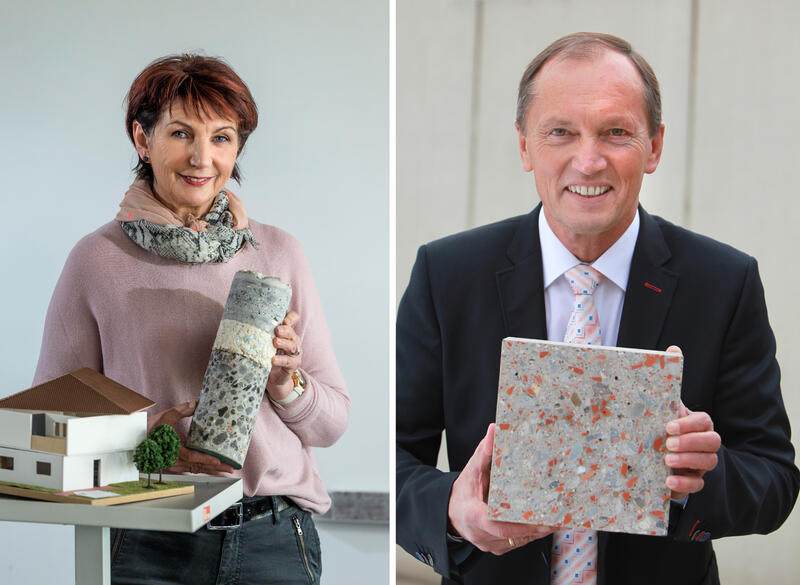
© DBU/Weisflog/Auerbach
Limiting land use with recycled concrete
“Gravel is quarried in huge pits for conventional concrete. This involves immense land use and leaves behind barren landscapes, which are difficult and expensive to renaturalize. Furthermore, spaces which are valuable in agriculture and forestry are lost permanently for such use. Using concrete rubble from demolition sites for recycled concrete is an important mainstay in limiting wasteful land use and slowing the growth of landfills,” according to Bottermann. And gravel pits are rarely located near the residential areas where the concrete is needed. This means long transportation routes between excavation areas and construction sites are necessary. By eliminating even a driving distance of 40 kilometers, in purely statistical terms, the climate damage to a small town of 35,000 residents can be prevented.
Exploiting the durability of building components
The growing world population, rising living standards and wasteful, thoughtless consumption of resources have led to increasing scarcity of raw materials. Mettke has dedicated practically her entire scientific career to the recycling of building materials. “Through their tireless advocacy of construction materials recycling, this year’s Environmental Prize recipients Mettke and Feeß have succeeded in steering the consumption of raw materials onto sustainable tracks and developing new, tenable secondary use options for used concrete,” says Bottermann. Although her interest originally involved the reuse of concrete slabs which had been previously used, Mettke is now nationally known in Germany as a specialist in the applications of recycled concrete. “The goal of her work is exploitation of the durability of building components, in order to save raw materials and energy and reduce harmful emissions. Thus Mettke makes an ongoing and outstanding contribution to the protection of our resources.”
Mettke teaches and researches at the BTU in Cottbus-Senftenberg
Mettke’s didactic abilities are also impressive. At the BTU in Cottbus-Senftenberg she has taught, among other subjects, circular economies, disposal logistics, open space design and historical preservation. In 2010 she qualified as a professor based on the subject “Material- and Product Recycling – Using the Example of Prefabricated Slab Buildings”. With the subsequent award of the “Venia Legendi” the cornerstone for the teaching authorization in the field “Construction Recycling” was laid. Her research was said to have shown that houses built with used concrete slabs were in no way inferior to houses using only new materials – neither in quality, comfort, nor in safety. “Thanks to her planning role, prototypes for new construction and reconstruction of clubhouses and residential buildings, and in landscaping- and dyke construction have been developed which are suitable for the international market,” in Bottermann’s words of praise. He stated further: “The used concrete elements can take on both a functional character, and a creative function.”
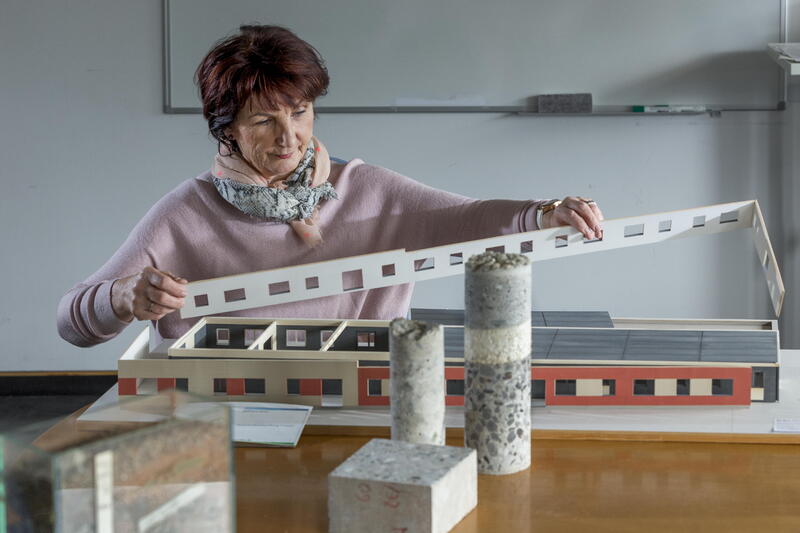
© Weisflog/DBU
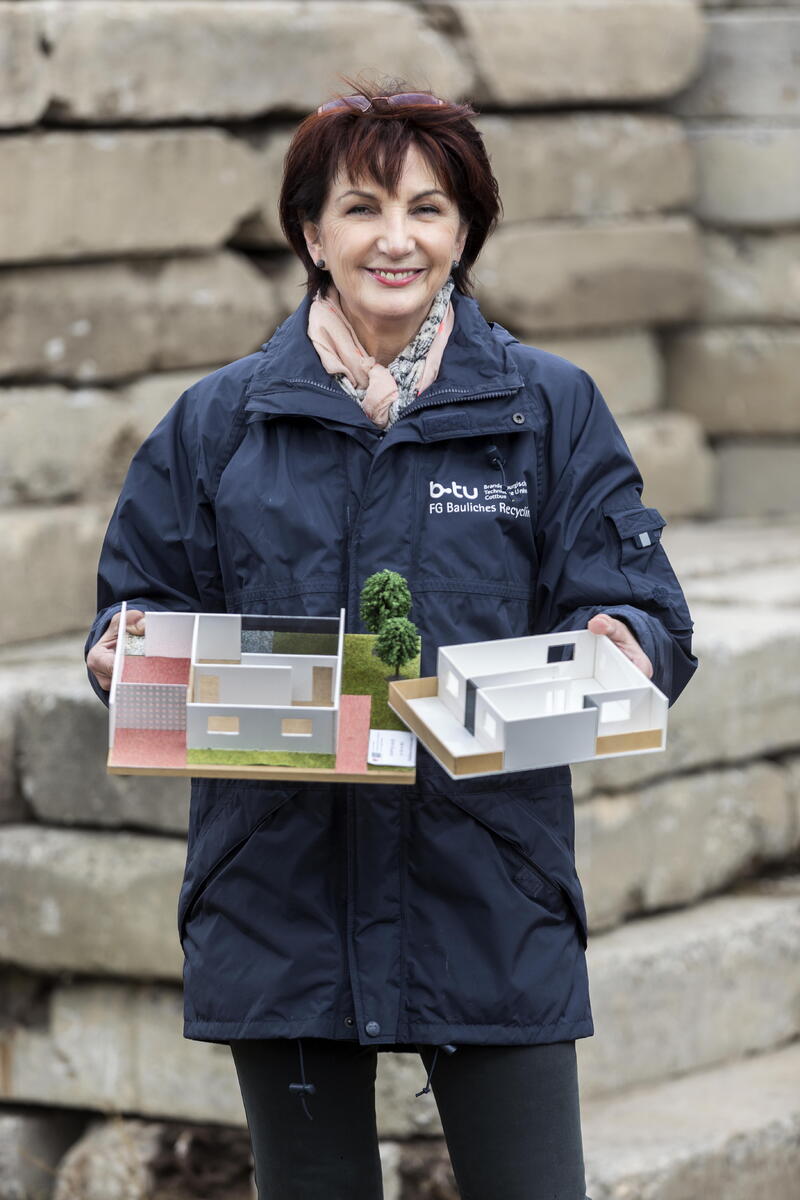
© Weisflog/DBU
Mettke called attention to environmental problems at an early stage
“Professor Angelika Mettke unites modern construction and sustainable environmental protection in remarkably committed manner. Even at a time when raw material shortages did not yet play such a great role, she fought persistently for her cause and brought widespread attention to the environmental problems associated with demolition- and dismantling processes. With courage, ambition and expertise she continues today to convince many skeptics. We can thank her proactive engagement for the fact that materials cycles have been revamped and improved, and that many new skilled jobs have been created.”
Bottermann: Mettke is strongly committed at all levels of activity
Beyond her teaching activities Mettke accompanies new construction projects with her scientific expertise and cooperates closely with companies to develop new market applications for recycled concrete. “In doing this, she demonstrates equal commitment and goal-orientation at every related level of activity – makes grant applications, supervises the practical deployment of prototypes, and presents the results at specialist conferences and in building committees,” emphasizes Bottermann. Among Mettke’s successes: in 2013, based on her research results, the Berliner Senate decided – as is already a normal procedure in Switzerland – to partly use recycled concrete in public building construction projects.
Finding sustainable solutions with interdisciplinary work
Bottermann considers it noteworthy that Mettke’s work is characterized by intensive cooperation among representatives of various fields of science, business and economics, administration and politics. “Only with an interdisciplinary approach can multifaceted challenges be met, and sustainable solutions found for the protection of the basic resources necessary to life,” says the DBU’s General Secretary.
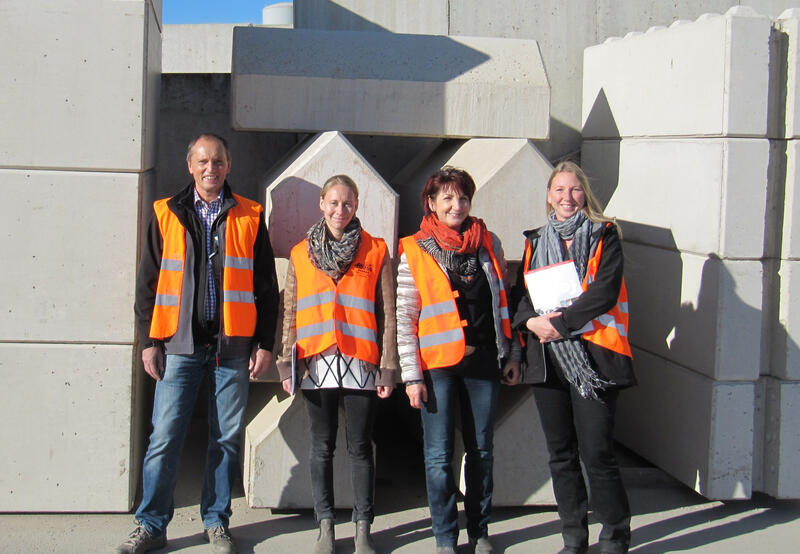
© Mettke/DBU
Entrepreneur Feeß: pioneer in recycled concrete
Like Mettke, who is a Doctor of Civil Engineering, the entrepreneur Walter Feeß is also known as a pioneer in recycled concrete. As far back as 20 years ago he laid the foundation for an innovative process by which old concrete can be broken down and made into a granular material known as recycled aggregate. This – instead of newly quarried gravel or other mineral material – is mixed proportionately into the fresh concrete. “With innovative entrepreneurial spirit, Walter Feeß pioneered the development of recycled building materials, old concrete, and construction waste. Thus he succeeded in creating a more environmentally-friendly and marketable alternative to traditional products. Raw materials used in construction can be saved and valuable earth can be preserved,” Bottermann pointed out.
Early recognition of the potential
The certified structural engineer recognized quite early the potential of this procedure and adapted it to the German market. With his family business, which Feeß directs in its second generation, he thus makes an active contribution to the protection of nature. Bottermann: “With the construction waste, which is processed into recycled aggregate, Walter Feeß has developed high-quality products which are used not only for recycled concrete, but also for road-building material or in soils and substrates, and as a peat substitute in humus manufacture through which moors can be protected. This represents applied climate protection.”
Focus on the entire value chain
The recycled concrete is of such high quality because of a special sorting- and washing process, Bottermann explains. “Only uniformly-sorted material with no waste matter, wood, foil or other foreign elements yields proper recycling material. From the disposal, through preparation, all the way to manufacture and reuse of construction waste and soils – with his company, Feeß has an impact on the entire value chain and stands for the necessary quality in the whole recycling process,” Bottermann stated further.
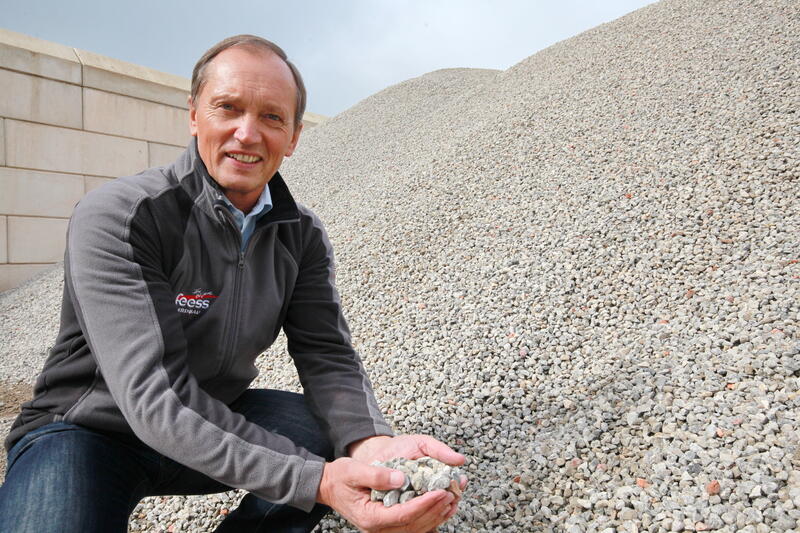
© Auerbach/DBU
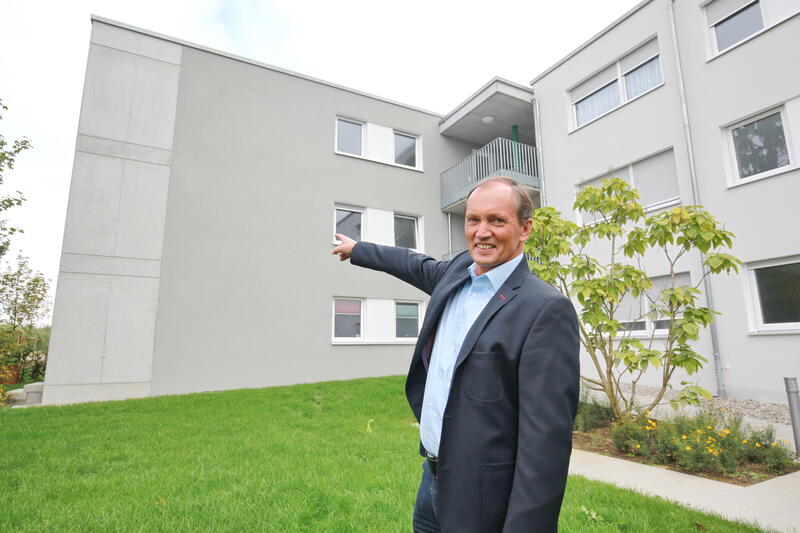
© Auerbach/DBU
Improved environmental compatibility and comparable economic efficiency
Feeß has been successful, as the first entrepreneur in Germany, in receiving building control certification for recycling aggregate from the German Institute for Building Technology (Deutsche Institut für Bautechnik). Besides environmental compatibility, the recycling aggregate met all requirements for the manufacture of fresh concrete, and was certified as providing comparable economy. Feeß is thus an important aggregate supplier to the concrete industry.
Important contribution to sustainable construction in Germany
Feeß has responded to the skepticism from the market with great persuasive energy and thus makes an important contribution to sustainable construction in Germany. He invests much time in explaining to interested lay people and professionals from all over Germany the advantages of recycled concrete. In Kirchheim unter Teck he built a new recycling center with an adjoining training center. He also introduces his projects at specialist conferences and events. “His commitment essentially arises from a deeply-felt responsibility to coming generations and thus involves entrepreneurial activity which is not always oriented merely to profit,” according to Bottermann. However this entrepreneurial courage can also pay, as the success of his flourishing building materials business demonstrates. Around 180 employees work in three locations, and since 2001 the firm has been a certified waste management facility. In Baden-Württemberg it has been, since 2010, the first approved supplier for concrete aggregate, and offers more than 30 different recycled products.
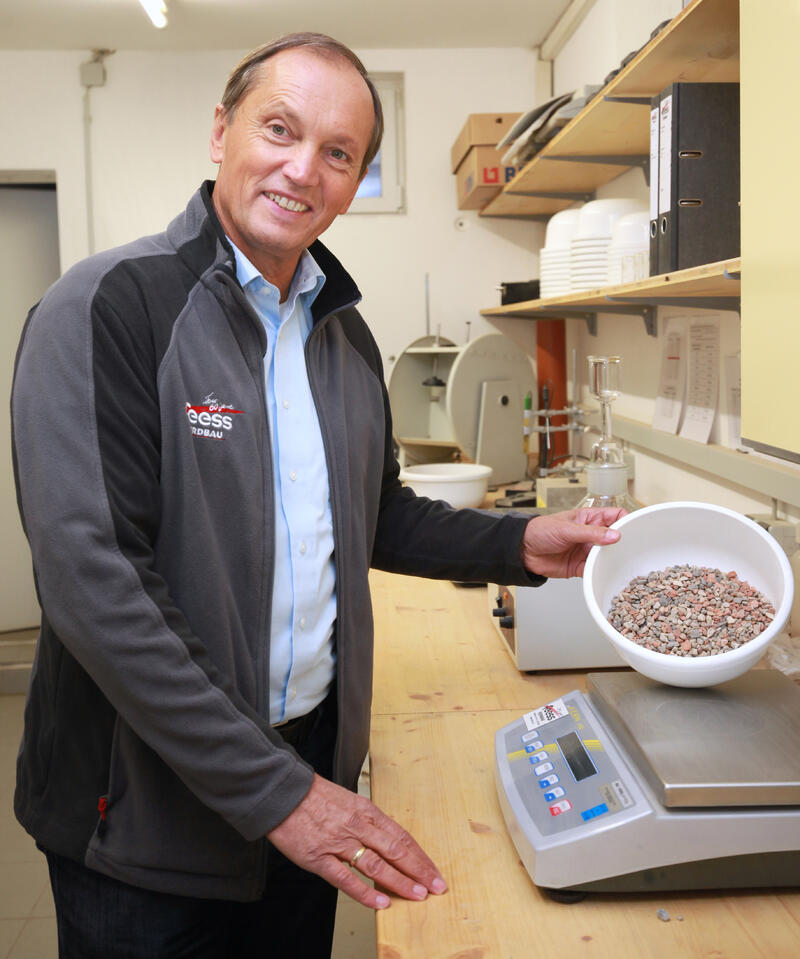
© Auerbach/DBU